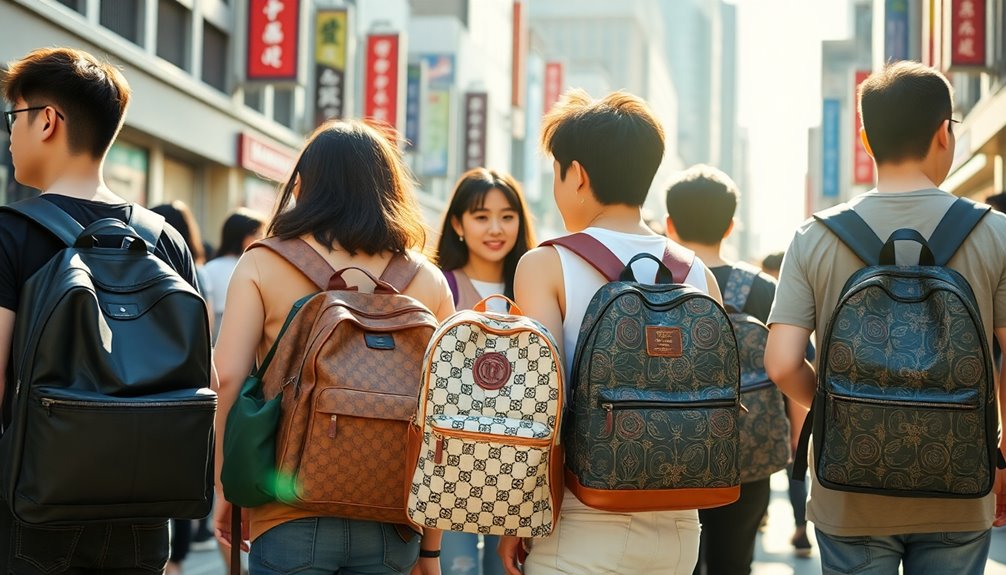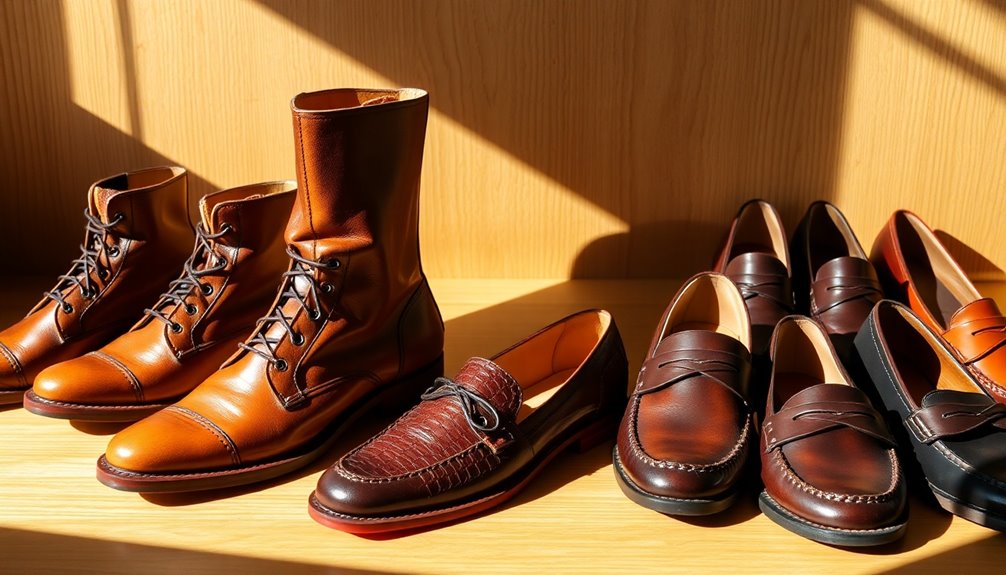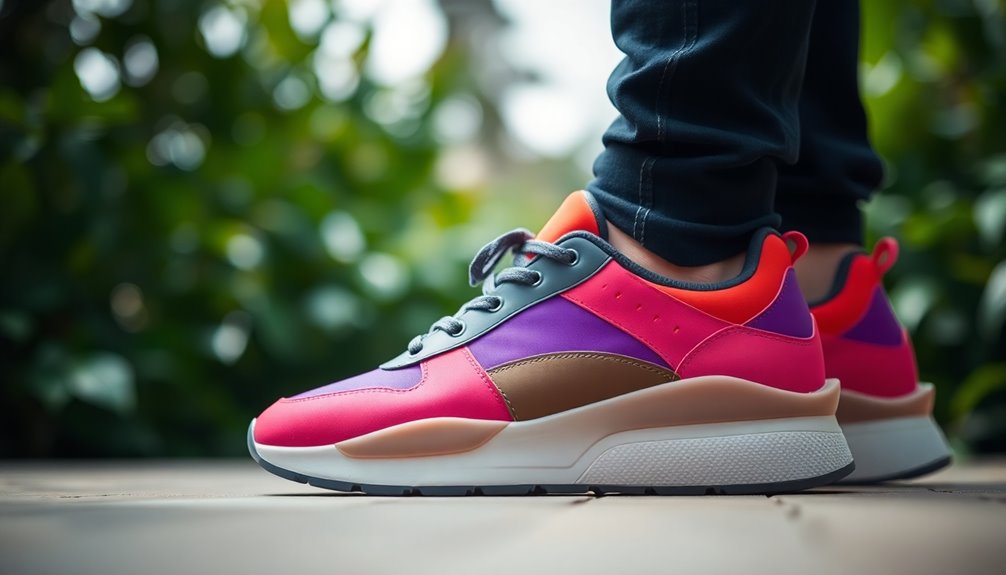If you're curious about shoe brands that support Israel, Puma stands out as a significant sponsor of the Israel Football Association. Their involvement has sparked protests, leading to a commitment to end this sponsorship by December 2024. Brands like Aesop and Ralph Lauren also have indirect ties to Israel through parent company investments. Coca-Cola has operations in an illegal Israeli settlement, further complicating their stance. While some brands focus on humanitarian efforts, others face backlash for perceived support of military conflicts. Keep exploring to discover more about these brands and their impact on the situation.
Key Takeaways
- Puma sponsors the Israel Football Association, including teams from illegal settlements, drawing calls for a boycott due to human rights concerns.
- Nike faced scrutiny over viral pro-Israel shoes, clarifying they are not official products, reflecting brand sensitivity to public sentiment.
- Aesop and Ralph Lauren are linked to Israeli investments through L'Oreal, indicating indirect support for Israel's actions.
- Coca-Cola operates a factory in an illegal Israeli settlement, showcasing its indirect endorsement of Israel's settlement regime.
- Brands like HP and Intel have significant investments in Israel, contributing to its military and surveillance infrastructure against Palestinians.
Direct Connections to Israel
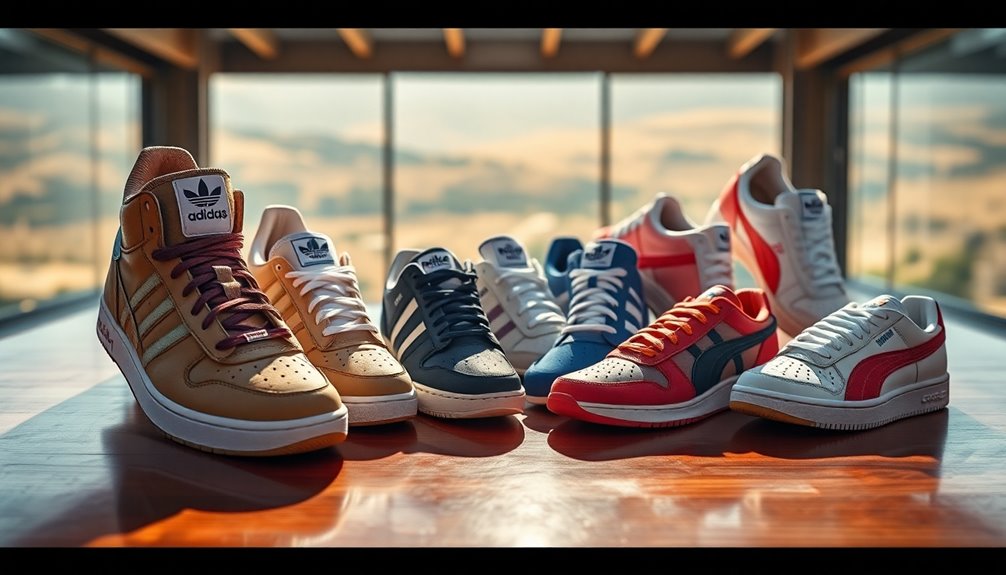
Several major shoe brands have established direct connections to Israel, most notably through sponsorships and partnerships that raise significant ethical concerns.
Puma stands out as the main sponsor of the Israel Football Association (IFA), which includes teams from illegal settlements on occupied Palestinian land. By sponsoring the IFA, Puma legitimizes its actions and supports Israel's settlement regime, contributing to the ongoing displacement of Palestinian families. Additionally, many brands, including Puma, contribute to sustaining Israel's military power, which further complicates the ethical implications of their involvement.
Puma's involvement doesn't just stop at sponsorship; the IFA actively lobbies FIFA against accountability for Israel's treatment of Palestinian sports. You might find it troubling that more than 200 Palestinian sports clubs have called on Puma to end this sponsorship, citing its support for apartheid and human rights violations.
Additionally, Puma's exclusive licensees have operations in illegal Israeli settlements, further entrenching the economic and social impacts of these settlements, which are considered war crimes under international law.
As you consider your footwear choices, it's important to recognize how these direct connections to Israel can affect not only consumer ethics but also the broader context of human rights and social justice.
Indirect Support Through Parent Companies
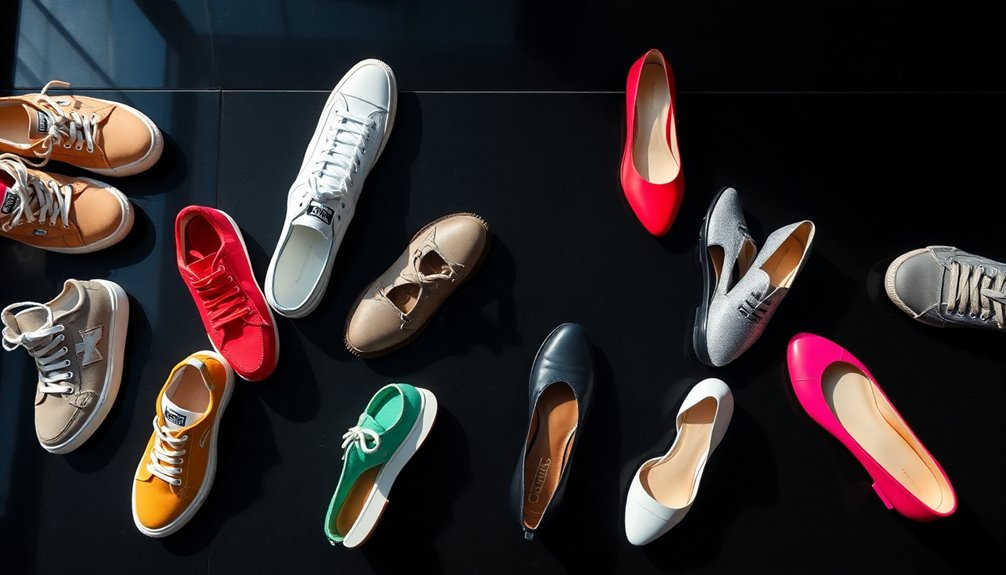
Many popular shoe brands may not be directly linked to Israel, but they often find themselves tied to the country through their parent companies. For instance, brands like Aesop and Ralph Lauren, owned by L'Oreal, have connections to Israeli investments through various subsidiaries. Additionally, Coca-Cola operates a factory in an illegal Israeli settlement, showcasing how businesses can indirectly support controversial practices through their supply chains.
Similarly, LVMH, which owns Sephora, might've potential indirect links to Israel through its extensive portfolio of luxury brands. Kering, while not specifically mentioned, may also have indirect ties through global investments, similar to other conglomerates. PVH Corp, the parent company of various global brands, could also have connections through its global operations. Capri Holdings, which owns Versace, Jimmy Choo, and Michael Kors, further illustrates this indirect support due to its ties with Israeli investments.
In the tech and retail sectors, companies like EssilorLuxottica and Inditex show how parent companies can contribute to the indirect support of Israel through their business operations. These connections can often go unnoticed, yet they play a significant role in the broader landscape of corporate involvement in the region.
Involvement in Israeli Technology
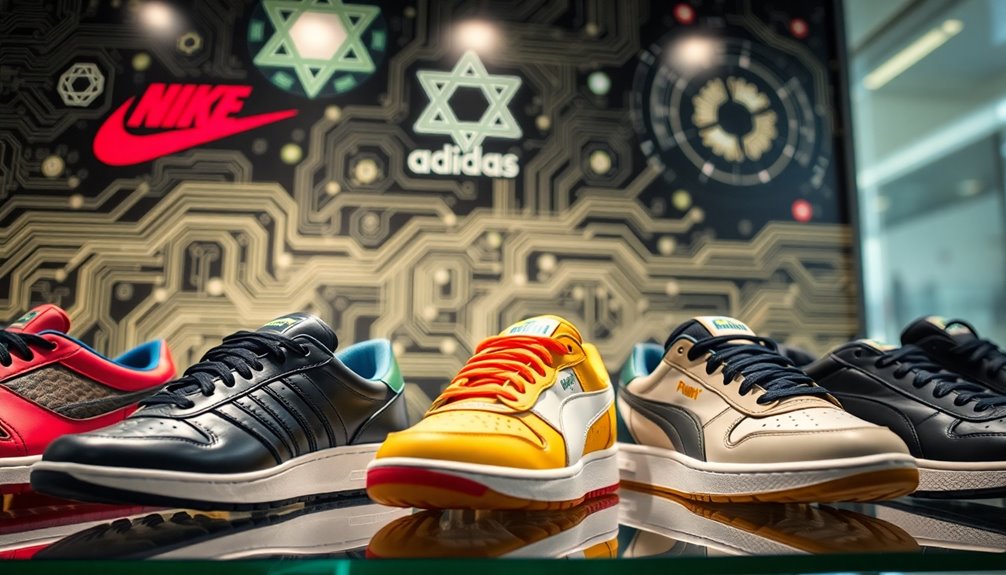
Engaging deeply in Israeli technology, numerous multinational corporations play a pivotal role in shaping the country's tech landscape. Companies like HP and Intel have significant investments that bolster Israel's technological infrastructure. For instance, HP provides Itanium servers for the Aviv System, which is involved in surveillance practices against Palestinians. Intel, on the other hand, operates R&D centers and plans to construct a new $25 billion chip factory in Israel. Meanwhile, the recent Tieks for Israel campaign has demonstrated how corporate support can also extend to humanitarian efforts in Israel. NVIDIA's involvement with AI technologies and its acquisition of Mellanox Technologies highlight the importance of Israeli innovation. Similarly, AMD and Qualcomm maintain a presence in Israel, focusing on tech advancements and wireless communication. Amazon and Google collaborate on Project Nimbus, providing cloud services that enhance Israel's tech capabilities, despite facing criticism for their implications. Microsoft also has a strong R&D presence, focusing on cloud and cybersecurity technologies, further solidifying Israel's tech landscape. Investments from firms like EssilorLuxottica and LVMH in Israeli startups underscore the country's vibrant entrepreneurial spirit.
Support for Israeli Military
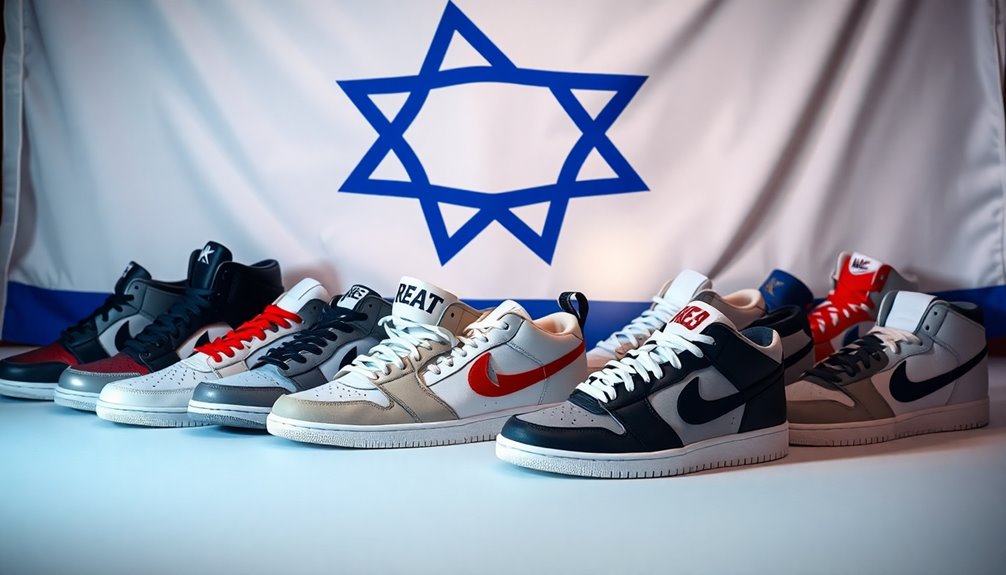
While some may overlook the implications of corporate sponsorships, brands like Puma significantly contribute to the Israeli military's infrastructure through their financial support.
By sponsoring the Israel Football Association (IFA), Puma lends international legitimacy to an organization that includes teams based in illegal settlements on occupied Palestinian land. This sponsorship not only bolsters the IFA but also indirectly supports the economic framework that fuels Israel's military operations. Moreover, over 10,000 tons of weapons were delivered to Israel by December 25, 2023, highlighting the extensive military support it receives.
Puma's exclusive licensees operate in these settlements, further entrenching their role in this contentious landscape. Over 200 Palestinian sports clubs have called on Puma to end its sponsorship, highlighting the widespread condemnation of this support.
Through its financial contributions, Puma helps sustain Israel's military power, enabling continued operations in Gaza and other areas.
Though there's no evidence that shoe brands directly supply military equipment, their economic involvement reinforces the military's capability. By investing in Israeli companies and projects, brands like Puma play a crucial role in sustaining the military infrastructure that impacts Palestinian life.
Thus, their sponsorships aren't merely commercial decisions but significant endorsements of policies that contribute to ongoing conflict and instability in the region.
Misrepresentation in Boycott Campaigns
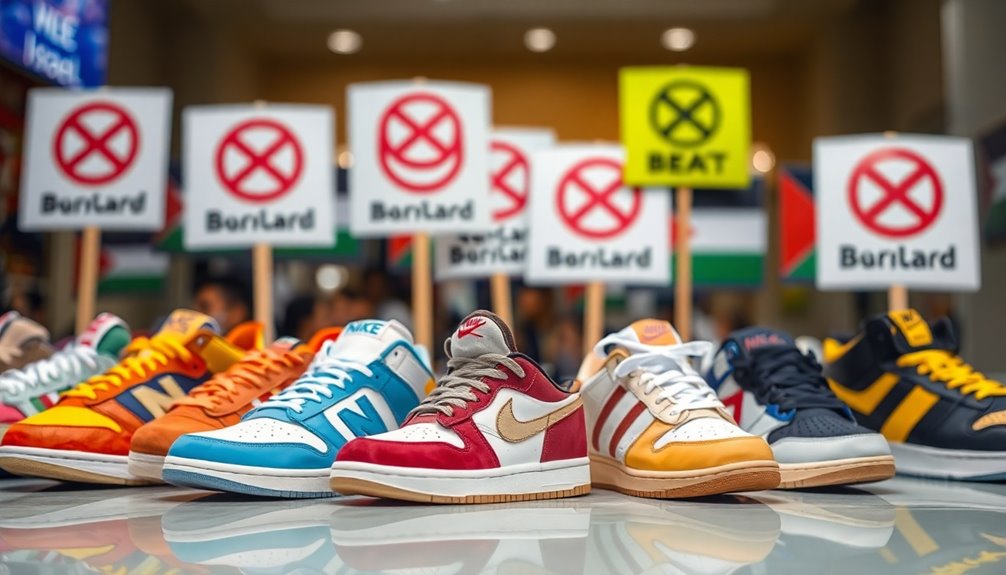
Misrepresentation in boycott campaigns has become a significant issue, complicating the dialogue surrounding the Israel-Hamas conflict. You might notice that misinformation spreads rapidly on social media, distorting facts and fostering division.
Fake accounts, some masquerading as Americans, flood platforms like X, Facebook, and Instagram with pro-Israel sentiments. Even AI tools like ChatGPT have been misused to generate misleading posts, amplifying false narratives.
You'll find that misleading content often includes edited videos and outrageous allegations against Palestinians, like claims of "crisis actors." These tactics aim to dehumanize and discredit legitimate grievances.
The Boycott, Divestment, Sanctions (BDS) movement emphasizes targeted boycotts, focusing on companies with direct ties to Israeli policies, rather than broad campaigns that dilute impact. Unfortunately, misleading lists circulating online can weaken genuine efforts. Recent reports indicate that state media from Russia, China, and Iran has been utilized to support Hamas and criticize Israel, further complicating the misinformation landscape.
State media and foreign influence from countries like Russia and Iran further muddy the waters, while some Israeli officials push disinformation campaigns. This manipulation not only misguides public opinion but also undermines meaningful dialogue.
To make a difference, you need to demand clarity and accuracy in your boycott initiatives, steering clear of misinformation that hampers your efforts.
Public Statements From Brands
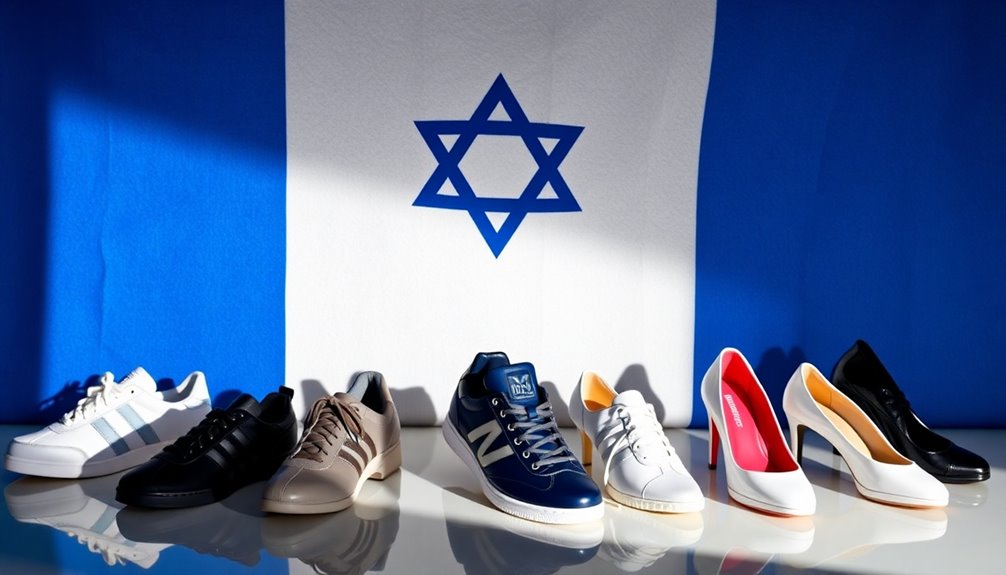
Numerous brands have found themselves at a crossroads, facing public pressure and calls for accountability regarding their affiliations with Israel.
Puma, for instance, announced it wouldn't renew its sponsorship of the Israel Football Association (IFA) after years of mounting pressure from activists and consumers. While Puma claimed this decision wasn't due to campaign pressure, internal communications suggest otherwise.
The BDS movement continues to urge a boycott until Puma's contract officially ends in December 2024, as their sponsorship has long been criticized for legitimizing Israeli settlements on occupied Palestinian land.
Nike, on the other hand, clarified that viral pro-Israel shoes aren't official products. These custom designs were created by a designer as a gift and aren't available for purchase, highlighting the importance of verifying information before reacting. Nike's statement emphasized the significance of accurate information in public discourse.
The impact of public pressure on brands like Puma is palpable, as protests and calls for accountability have led to significant reputational damage.
Athletes, stores, and organizations have reconsidered their partnerships, demonstrating how collective action can influence corporate decisions regarding their affiliations and support for Israel's military and settlement activities.
Notable Brand Actions and Donations
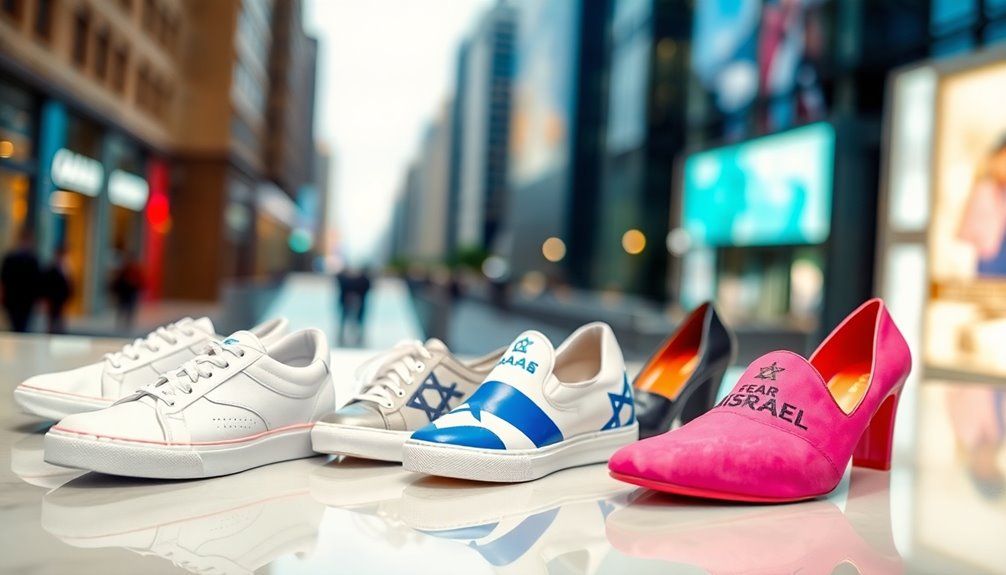
Many brands have taken significant actions and made notable donations in response to the ongoing conflict and humanitarian crisis in the region.
Tory Burch, for example, donated a total of $250,000, including personal contributions and matching employee donations to the Alliance for Middle East Peace. They also support the International Committee of the Red Cross, focusing on humanitarian aid and peace promotion.
Chanel stepped up with a $4 million donation aimed at alleviating the humanitarian crisis, expressing their sadness over the recent terrorist attacks against Israeli citizens. They circulated an internal note on social media to highlight this commitment.
The PVH Foundation provided grants to organizations like the International Committee of the Red Cross and Magen David Adom, while also matching employee donations for relief initiatives.
Authentic Brands Group launched a one-for-one matching donation program to support groups like Magen David Adom and ERAN, emphasizing a call for peace. Additionally, billionaires and Jewish communities have made significant contributions, including funds and essential supplies to aid those affected by the crisis.
These actions reflect a broader commitment among brands to support humanitarian efforts and address the immediate needs of those affected by the crisis in the region.
Frequently Asked Questions
How Can I Verify a Brand's Stance on Israel?
To verify a brand's stance on Israel, start by using online tools and product checkers. Enter the brand's name to see its affiliations.
Check for public statements from company leaders, and look for support in military or government initiatives.
Investigate their investments in Israeli technologies or partnerships.
You can also consult boycott lists from the BDS movement and follow social media for updates on brand actions related to Israel.
Are There Shoe Brands That Actively Oppose Israeli Policies?
Yes, some shoe brands actively oppose Israeli policies.
To find these brands, you can research their public statements, policies, or involvement in social justice movements.
Look for companies that participate in campaigns supporting Palestinian rights or those that have pulled out of the Israeli market.
Social media and advocacy groups often highlight brands that take a stand against human rights violations, making it easier for you to make informed purchasing decisions.
What Actions Can Consumers Take Against Brands Supporting Israel?
If you want to take action against brands supporting Israel, start by researching which companies align with that stance.
You can boycott those brands, write letters to express your concerns, and participate in protests or online campaigns to raise awareness.
Consider supporting ethical alternatives that don't have ties to Israel.
Engaging with organizations advocating for boycotts can amplify your efforts and help spread the message to a broader audience.
How Does Consumer Sentiment Affect Brands' Connections to Israel?
Consumer sentiment significantly impacts brands connected to Israel.
When you express your disapproval through boycotts, brands often feel the pressure to reconsider their ties.
If you and others shift your purchasing decisions based on ethical beliefs, companies may alter their strategies to regain favor.
Social media amplifies your voice, making it easier for you to share your views and influence others, ultimately affecting brand loyalty and market performance.
Your choices can drive meaningful change.
Are There Alternative Shoe Brands Supporting Palestinian Causes?
If you're looking for shoe brands that support Palestinian causes, consider options like PaliRoots, which donates meals to children in Gaza.
You can also explore brands that focus on fair-trade practices and cultural preservation, like Darzah and the Ajdadi Collective.
These brands not only offer stylish footwear but also contribute to meaningful social impact, ensuring your purchase aligns with your values while promoting Palestinian artisans and communities.
Conclusion
In conclusion, many shoe brands openly support Israel, whether through direct connections, parent company ties, or involvement in technology and military efforts. While some brands face backlash from boycott campaigns, their public statements and notable actions reflect their commitment. If you're considering your choices, it's essential to stay informed about how your favorite brands align with your values. By doing so, you can make confident decisions that resonate with your beliefs and support the causes you care about.



